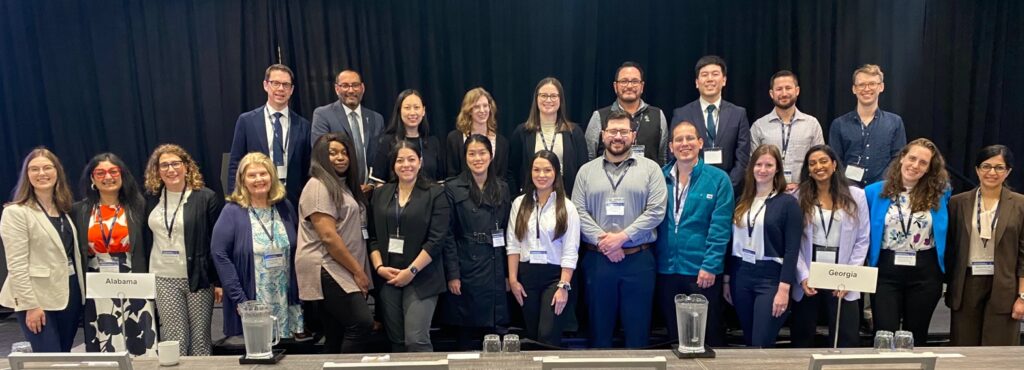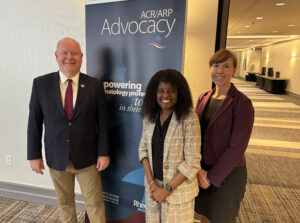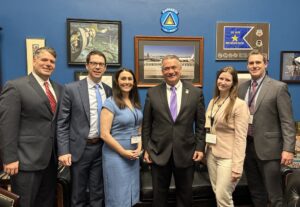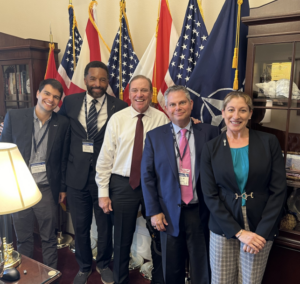
The 2024 Advocacy 101 program cohort, including 17 ACR rheumatology fellows in training and interprofessional members of the ARP.
On May 7, nearly 100 rheumatologists and rheumatology professionals converged in Washington, D.C., for the ACR’s annual Advocacy Leadership Conference (ALC).

Rep. Larry Bucshon, MD, with ACR President Deborah Dyett Desir, MD, and Government Affairs Committee Chair Christina Downey, MD.
Over the two-day conference, attendees from the ACR’s Executive Committee, Board of Directors and advocacy-related committees joined a cohort of 17 Advocacy 101 participants. These rheumatology advocates participated in a variety of activities to further the ACR’s legislative priorities, including collectively completing 137 meetings with lawmakers and their staff on Capitol Hill.
Several ACR committees—the Committee on Rheumatologic Care, the Insurance Subcommittee, the Community Practice Council, the Government Affairs Committee (GAC) and RheumPAC—met the morning of May 6 to discuss a variety of issues affecting the rheumatology care community and discussed ways the ACR can work to alleviate these problems.

Advocates from Nebraska met with Rep. Don Bacon to discuss protecting access to care by supporting Medicare providers.
While the volunteers serving on these committees met to discuss their business items, Advocacy 101 attendees learned about the legislative process and how government policies impact the practice of rheumatology and heard from a panel of experienced ACR advocates. Attendees then applied their skills in an Advocacy Knowledge Bowl. In the afternoon, all attendees united to hear from GAC Chair Christina Downey, MD, Rep. Larry Bucshon, MD (R-Ind.), and volunteer leaders from the ACR.
Following these activities, attendees met with members of Congress and their staff to advocate for two pieces of legislation on Capitol Hill:

Advocates from Florida talked with Rep. Neal Dunn, MD, to discuss sustaining Medicare to support patients and providers.
- Strengthening Medicare for Patients and Providers Act (H.R. 2474): This bill would provide an annual inflationary update based on the Medicare Economic Index (MEI) in the Medicare Physician Fee Schedule (MPFS).
- The Provider Reimbursement Stability Act (H.R. 6371): This bill would reduce the impact of budget neutrality requirements on the MPFS by raising the threshold from $20 million to $53 million.
Notably, the week after the ACR fly-in meetings on Capitol Hill, the Senate Finance Committee released a white paper focused on addressing these issues and echoing the specific concerns and policy approaches the ACR voiced to members of Congress. See the white paper Bolstering Chronic Care through Medicare Physician Payment (senate.gov) for details. The ACR will continue to work with policymakers to advance solutions for Medicare payment problems and to advocate for policy solutions for issues faced by ACR and ARP members.
Now it’s your turn: Amplify attendees’ efforts by sending letters to your members of Congress in the Legislative Action Center. It takes only a few minutes to do your part, and your lawmakers want to hear from you.


